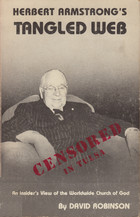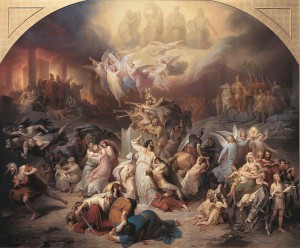 About 15 years ago I placed online a short account of how I came to find a new life, a new way of thinking and of self-acceptance after too many years as a dedicated member of the Worldwide Church of God Armstrong cult. I was one of many ex-members of that cult to add their little bios to that site. We felt it worthwhile to share our experiences to encourage others who were grappling with the various stresses and challenges of unraveling the thought-habits of years and finding a much healthier way of life as we had done. Above all we wanted to assure them that there really was a better life beyond and it was never too late to change one’s life’s direction. Recently I realized that there was one aspect of my final years in that cult, the years immediately preceding my leaving that cult, that I have very rarely spoken about in public forums. Given that there has recently appeared in print a charming little account of my former life that conveys a bizarre image of my former and current psychological makeup I thought it might be worthwhile for me to share for anyone half interested what my final years in that former religion were like. (I say it was a “bizarre” account. I must refrain from using the word “dishonest” because I am sure the author would certainly have taken the trouble to have interviewed me and asked a few basic questions had he the time. It is quite understandable that busy people would need to rely upon stereotyping and armchair psychoanalysis to find the profile they need to prove their points about someone they wish to denigrate.)
About 15 years ago I placed online a short account of how I came to find a new life, a new way of thinking and of self-acceptance after too many years as a dedicated member of the Worldwide Church of God Armstrong cult. I was one of many ex-members of that cult to add their little bios to that site. We felt it worthwhile to share our experiences to encourage others who were grappling with the various stresses and challenges of unraveling the thought-habits of years and finding a much healthier way of life as we had done. Above all we wanted to assure them that there really was a better life beyond and it was never too late to change one’s life’s direction. Recently I realized that there was one aspect of my final years in that cult, the years immediately preceding my leaving that cult, that I have very rarely spoken about in public forums. Given that there has recently appeared in print a charming little account of my former life that conveys a bizarre image of my former and current psychological makeup I thought it might be worthwhile for me to share for anyone half interested what my final years in that former religion were like. (I say it was a “bizarre” account. I must refrain from using the word “dishonest” because I am sure the author would certainly have taken the trouble to have interviewed me and asked a few basic questions had he the time. It is quite understandable that busy people would need to rely upon stereotyping and armchair psychoanalysis to find the profile they need to prove their points about someone they wish to denigrate.)
First chinks in the armour
The first slight cracks in my faith in the teachings of the cult came when I decided to study in depth each book of the Bible as a discrete unit, as if it were not part of the canon. I would even try to read it as if I knew absolutely nothing at all about anything else in the Bible. That is, I would try to read each book to try to ascertain what it was saying in its own terms — without any reference in my own mind to any other canonical work. Of course most books, especially in the New Testament, do contain references to other biblical books. But I did not want to read, say, Romans, with any baggage in my head from what any other letter or gospel said. That process led to some interesting results. I began to see that some of the church’s teachings were really founded on unjustifiable interpretations. What’s more, I began to notice many passages that I had once read so often but also passed over so often without realizing their full import for the message the author was trying to convey. I took a number of questions to our ministry and earned myself a few worried looks. I was beginning to realize I was coming to understand and know more about what the Bible says than our trained ministry. I could see that they had not been taught to study the Bible as such but only to study the church’s teachings in the Bible. Continue reading “My Last Days In the Cult: My Exit Story”

